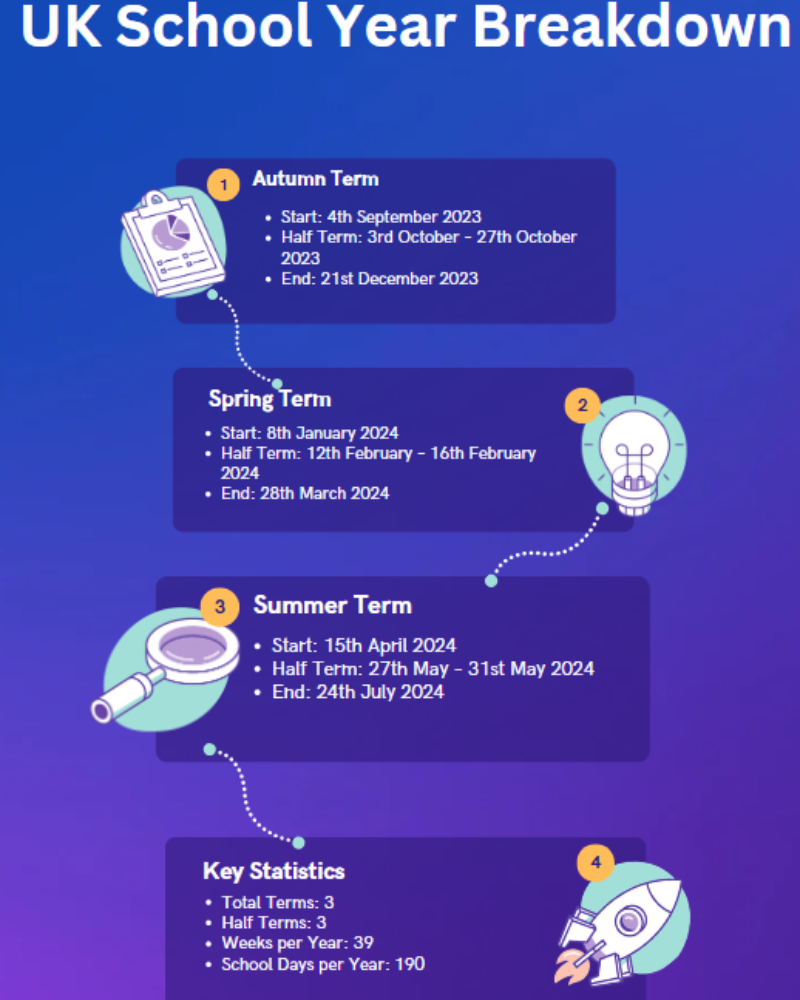In the United Kingdom, the academic calendar is meticulously structured to balance educational rigour with adequate breaks, promoting both learning and well-being. Understanding the rhythm of the school year is crucial for students, parents, and educators alike. This guide breaks down how many terms are in a school year, the number of half terms, weeks, and school days in a year in the UK, followed by practical tips to maintain productivity during term time.
Autumn term – School Days in the UK
| Beginning of the Academic Term | Mid-term | End of term |
|---|---|---|
| 4 September 2023 | 3 October to 27 October 2023 | 21 December 2023 |
Spring term – School Days
| Beginning of the Academic Term | Mid-term | End of term |
|---|---|---|
| 8 January 2024 | 12 February to 16 February 2024 | Thursday 28 March 2024 |
Summer term – School Days
| Beginning of the Academic Term | Mid-term | End of term |
|---|---|---|
| 15 April 2024 | 27 May to 31 May 2024 | 24 July 2024 |
Key Statistics
- Terms: 3 per academic year.
- Half Terms: 3 per academic year, one in each term.
- Weeks: The school year encompasses approximately 39 weeks.
- School Days: Around 190 days, excluding weekends and public holidays.
How Many Terms are in a School Year in the UK
The UK school year is divided into three main terms, punctuated by half terms, and culminates in a longer summer break. Here’s a breakdown:
- Autumn Term: Begins in early September and ends in December, with a one-week half term in late October.
- Spring Term: Starts in January and finishes in April, featuring a one-week half term in February.
- Summer Term: Commences after the Easter break, typically in late April, and concludes in July, with a one-week half term at the end of May.
How Many Half-terms are in a School Year in the UK?
- Three Half Terms – One in the Autumn Term, one in the Spring Term, and one in the Summer Term. These breaks are crucial for providing a respite from the rigours of schooling, allowing students and teachers alike to recharge. They’re a key part of the UK academic calendar, ensuring balance between study and well-being.
How Many Weeks are in a School Year UK?
The total duration of the UK school year, encompassing terms and half terms, typically spans:
- 39 Weeks – This includes teaching time and the scheduled breaks, ensuring that the educational process is both comprehensive and manageable.
How Many School Days are in a Year in UK?
Focusing on the days dedicated to education:
- 190 School Days – This figure excludes weekends and public holidays, concentrating on the days when schools are actively engaged in teaching and learning activities.

6 Tips for Staying Productive During School Terms
Staying productive during school terms is essential for academic success and overall well-being. Here are some strategies and tips to help students maintain focus, manage their time effectively, and achieve their educational goals:
1. Create a Structured Schedule
- Plan Your Week: Use a planner or digital calendar to map out your week, including classes, study time, extracurricular activities, and personal time. This helps make the most of your term time weeks and maintain a healthy balance.
- Set Daily Goals: Break down your tasks into daily objectives. Achieving these smaller goals can help maintain momentum and provide a sense of accomplishment.
2. Prioritise Tasks
- Use a Priority Matrix: Categorise tasks based on their urgency and importance. Focus on what needs to be done immediately and what can wait, ensuring you’re not spending all your time on less critical tasks.
- Break Down Large Assignments: For larger projects or study goals, break them into smaller, manageable parts. This can prevent feeling overwhelmed and help you progress steadily towards completion.
3. Eliminate Distractions
- Create a Dedicated Study Space: Having a quiet, organised space for studying can help minimise distractions and improve focus.
- Limit Digital Distractions: Set boundaries for social media and internet use during study times. Apps that block distracting websites or limit phone use can be helpful tools.
4. Embrace Effective Study Techniques
- Active Learning: Engage with the material through summarisation, teaching others, or applying concepts to different scenarios. This can enhance understanding and retention.
- Use Study Aids: Flashcards, mind maps, and quiz apps can make learning more interactive and effective.
5. Take Care of Your Well-being
- Regular Breaks: Follow the Pomodoro Technique or a similar method to ensure you take short breaks during study sessions. This can prevent burnout and improve productivity.
- Exercise and Sleep: Regular physical activity and maintaining a healthy sleep schedule can improve concentration, memory, and stress levels.
6. Seek Feedback and Support
- Ask for Help: Don’t hesitate to ask teachers, tutors, or peers for help if you’re struggling with a topic. Sometimes, a different perspective can make all the difference.
- Use Tutoring Services: Private tutoring can provide personalised support and guidance, helping to clarify difficult topics and improve academic performance.

How Many School Holidays in a Year UK
Number of School Holidays UK varies by nation and local authority, but most state schools follow a three-term year with six main holiday blocks: October half term, Christmas, February half term, Easter (spring), May half term, and the long summer break. In total, that’s around 13 weeks off (about six weeks in summer, two at Christmas, two at Easter, and three weeks across the half terms), plus bank holidays and occasional INSET/staff-training days set by the school. Always check your council or school calendar for exact dates.
Conclusion
The UK school year, with its clear structure of terms and breaks, provides a solid framework for academic achievement and personal growth. By effectively utilising holidays for rest, enrichment, and exploration, and maintaining a disciplined yet balanced approach during term time, students can maximise their learning outcomes. Private tutoring emerges as a powerful tool in this ecosystem, offering customised support that can significantly enhance a student’s academic journey. Embracing these strategies can lead to a fulfilling and successful educational experience in the UK. With a clear understanding of how many school days and weeks there are, families can plan ahead for a successful and enjoyable academic journey.
FAQs:
Do Schools Have to be Open for 190 days?
- England and Wales: Schools are required to be open to pupils for 190 days in an academic year. In addition to these days, teachers are required to be available for work for an additional 5 days, often referred to as inset or training days, making a total of 195 working days for teachers.
- Scotland: The number of school days is slightly different. Schools are typically required to be open to pupils for 190 days. However, local authorities have the flexibility to set term dates and holidays, which means the exact number of days can vary.
- Northern Ireland: Schools are required to be open for at least 200 days per year.
These requirements ensure that pupils receive a consistent amount of education each year, although the exact number of school days can be influenced by local authorities and specific school policies.
How Many School Days are There in a Year in the UK in 2024?
Schools should be open to pupils for at least 190 days in the academic year. Along with this, they have to allow for a minimum of 5 further days for teacher training, otherwise known as INSET days. This means that teachers will always work at least 195 days. This applies to most areas of the UK, like England and Wales; however, specific term dates may differ depending on the local authority.
In most of the UK, schools work on broadly similar outlines. The academic year 2023-2024 would typically start around early September and end by late July. For example, in North Yorkshire, the 2023-2024 school year will begin on 4 September 2023 and end on 22 July 2024. Meanwhile, in Wales, the 2023-2024 school year is almost identical, from early September to mid-to-late July.
Although a great deal of flexibility exists at local authority and individual school level, especially for academies and free schools, slight variations may exist. There is always the safe option of checking locally with your local authority or individual school for the exact dates. More information on school holiday dates and terms dates can be found on official local authority Websites or the UK Government’s education pages.
How Many Weeks a Year do UK Teachers work?
UK teachers are generally required to work for 195 days per year. This includes 190 days when the school is open to pupils and an additional 5 days designated for in-service training (INSET) and other professional development activities.
To break it down in terms of weeks:
- 195 days is equivalent to 39 weeks (assuming a 5-day working week).
Beyond the everyday school days, much of a teacher’s time is spent outside of these official days of work in lesson planning, grading, or other administrative tasks, thereby extending their working hours beyond that formally engaged in the school calendar. The number of weeks they are officially required to be at school is approximately 39 weeks per year.
What are the UK school holidays for 2024-25 in Bristol?
The school term and holiday dates for Bristol’s Community and Voluntary Controlled schools for the 2024–2025 academic year are as follows:
- Term 1: Monday, 2 September 2024 to Friday, 25 October 2024
- Term 2: Monday, 4 November 2024 to Friday, 20 December 2024
- Term 3: Monday, 6 January 2025 to Friday, 14 February 2025
- Term 4: Monday, 24 February 2025 to Friday, 4 April 2025
- Term 5: Tuesday, 22 April 2025 to Friday, 23 May 2025
- Term 6: Monday, 2 June 2025 to Tuesday, 22 July 2025
Please note that individual schools may set their own INSET (In-Service Training) days, during which pupils do not attend. It’s advisable to check directly with your child’s school for any variations to these dates.
How many weeks do teachers work per year UK?
Most UK teachers are contracted for 195 days per year, about 39 weeks of directed time. That’s 190 teaching days with pupils plus 5 INSET/training days. Planning, marking, and extra duties often happen outside these hours, so actual workload varies by school and role.









